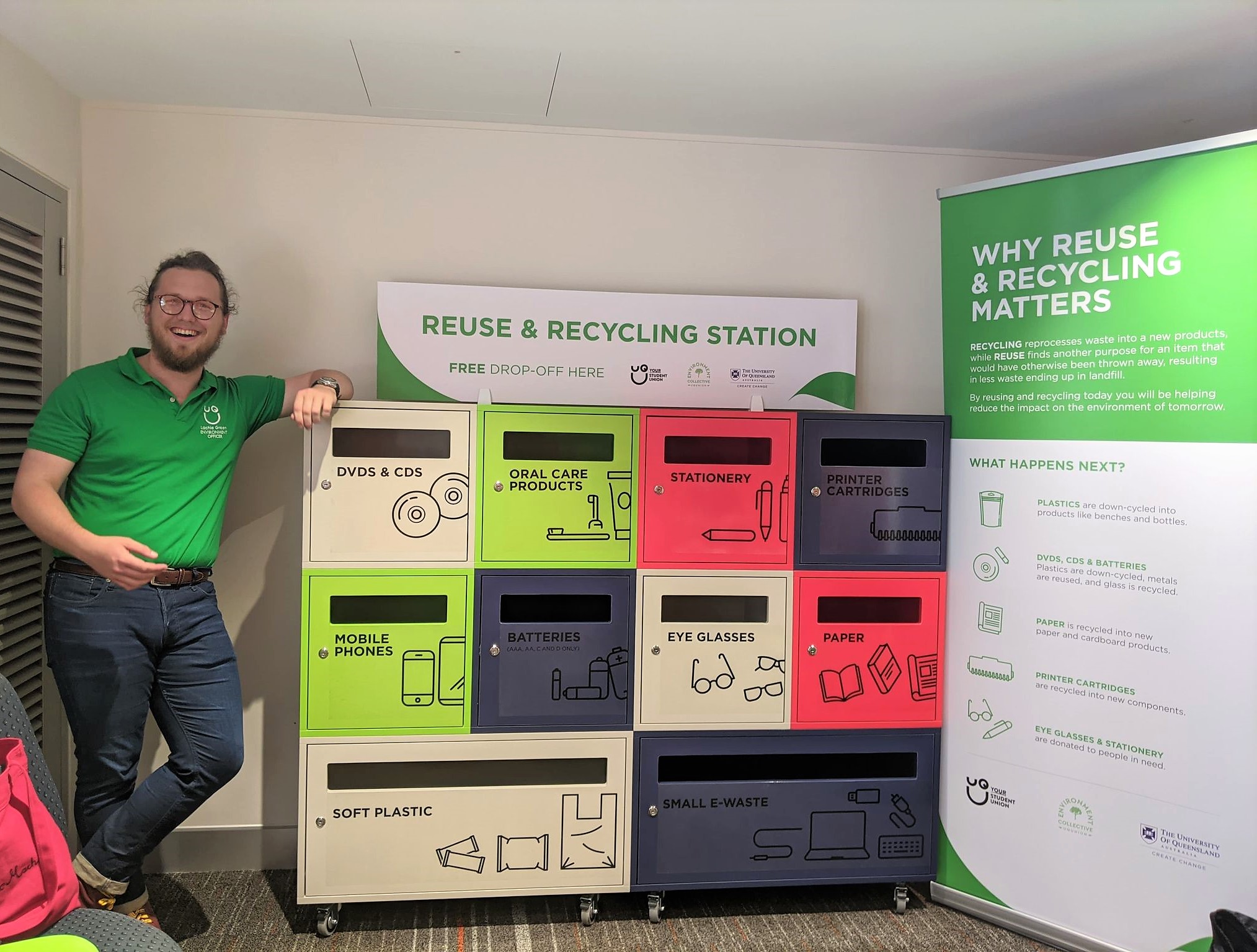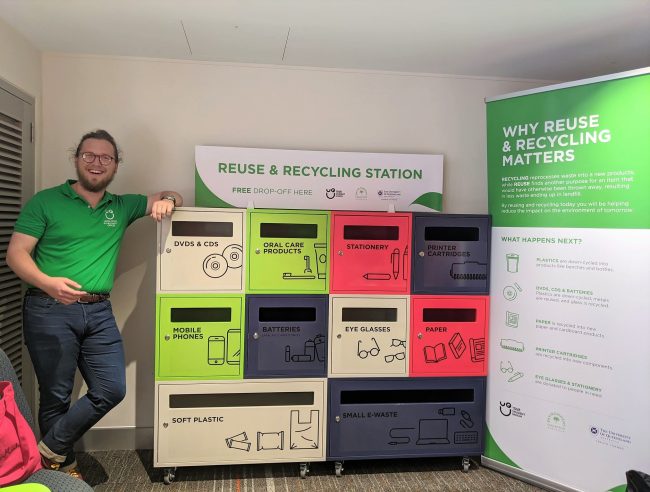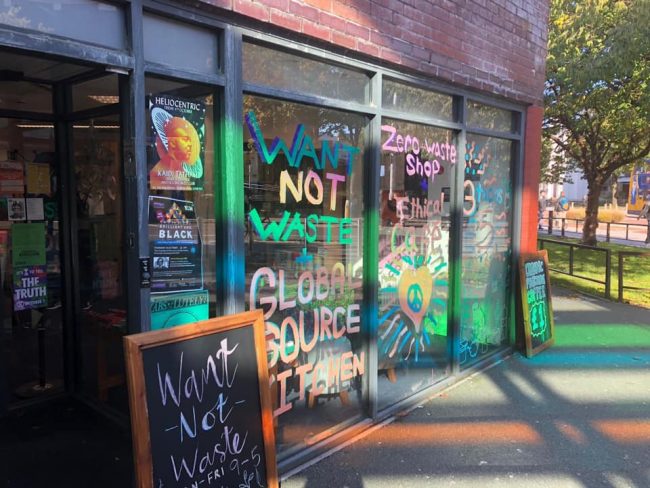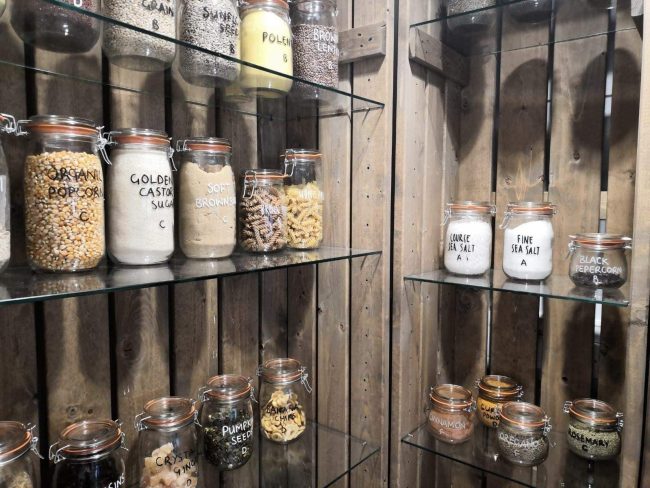
Reuse & Recycle at UQ
Reuse & Recycle at UQ
“Pursuing sustainability at universities is one of the main strategies to strengthen society, especially where aspects of social and economic equity and a healthy environment are taken into account.” (Ávila et al., 2017)
In June of 2019, before Coronavirus became a global pandemic, I had the opportunity to travel to England, and whilst I was there, spend time at a number of UK Universities. In particular, I spent time at the University of Manchester and its Students’ Union, which comprised of student spaces, retail outlets and health and wellbeing counseling services, much like we have available at UQ. While I was there, it stood out to me that the University was aiming to make their campus a more sustainable place, with a zero-waste shop right at the entrance of one of their main buildings, and a re-use and recycling station just next door.
After doing some research, I discovered that Manchester University was listed as one of the top three best universities in the world for recycling and sustainability on the Times Higher Education World University Ranking website. I also noticed that the University of Queensland was not included in the top 100. This shocked me, and prompted me to look into recycling in Australia further. According to the National Waste Report (2018), Australia generated an estimated 67 million tonnes of waste in 2017, an amount equivalent to 2.7 tonnes per person. Recycling reduces energy consumption, improves the soil, and helps to minimise pollution, yet Australia only recycled approximately 10% of its total waste in 2018, and the state of Queensland is one of the worst offenders (Paul’s Rubbish Removal, 2020).
Upon my return to UQ, I made an effort to actively take note of some UQ Sustainability initiatives in place, and noticed a variety of innovative initiatives such as the sale of metal straws at various outlets, bird boxes and electric vehicle charging stations. However, I noticed that they were not as visible to students on campus as those I had witnessed overseas and that the average student was not aware of how to actively contribute to sustainability at UQ.
That was until recently, when the UQ Union Environment Collective and UQ Sustainability Office revealed a brand-new Reuse and Recycling Station in October, similar to the one I had seen overseas. Located in the Kingham Room in the UQ Union Complex, this station provides students with access to a huge range of waste streams that have not been available until now, allowing them to recycle items such as batteries, soft plastics and DVD’s. A fantastic initiative and one that actively includes students in sustainability efforts, I set out to find out more about this collaborative project. I contacted Lachlan Green, the 2020 UQ Union Environmental Officer to determine the thought and planning process behind the new student-facing initiative.

Lachlan Green (UQ Union Environment Officer) with the new Reuse & Recycling Station at UQ
Rebekah Thornton – “Hi Lachlan, thank you for meeting with me today about the Reuse and Recycling Station. Would you be able to give me a bit of background information on what it is and what it does?”
Lachlan Green – “So the station allows students to drop off a variety of items that are harder for them to recycle themselves. The different waste streams go to a variety of locations for reuse or industrial recycling. Your standard ones, like e-waste, printer cartridges and soft plastic, go for recycling with external providers. My favourites, though, are the DVDs and CDs, which go to a community group who use them to make playing card holders for people with physical impairments in their hands. Pretty cool!
Thornton – “That sounds amazing! How did you, in your position at the UQ Union and the UQ Sustainability come up with the idea in the first place?”
Green – “Basically, it’s all about collaboration and inspiration. We identified that we were lacking a space on campus for students to engage with reuse and recycling programs. So we looked outwards, toward places that had these recycling hubs where you can drop all the ‘hard to sustainably dispose of’ stuff. The City of Hobart and Cairns, and the Universities of Sheffield (UK) and Toronto (USA) had some that basically became our templates.”
Thornton – “What was the process of setting it all up?”
Green – “We had to find a spot to put it first and foremost, one that was easy to locate but also out of the way enough so people didn’t just dump garbage on it – honestly this was the longest part of the process. Once we had locked in a spot with the UQU, the Sustainability Office cut loose with construction and then bam, there it was”
Thornton – “And what do you aim to achieve with the station?”
Green – “Look my goal has always been for students to be able to effectively identify with the environment. I don’t think a hub for recycling will single handedly preserve the environment worldwide, but it will give a chance for students to be pragmatic in their convictions. I want students to have a place to act on their sustainable instincts. As a bonus, if the hub is successful, it sends a really powerful, practical message. Hey world, there are a bunch of young people here that do care about the environment, that act on it, and there’s more for all of you to do too.”
Thornton – “It’s definitely a great initiative! I know it’s only been there for a few weeks, but what has the reaction from students been like”
Green – “I mean, seeing as it’s only been up and running for a few weeks, it’s a bit hard to gauge. But looking at the social media reaction, it’s hugely popular. Lots of tagging mates, voicing excitement and congratulating, people asking for one at Gatton, et cetera… But also within this first week, without much advertising, there’s a whole lot of stuff in there already! So that definitely means there’s an appetite for these kinds of things at UQ”
“Hey world, there are a bunch of young people here that do care about the environment, that act on it, and there’s more for all of you to do too.” (Green, 2020)


The Zero Waste Shop at the University of Manchester Students’ Union (United Kingdom). Source: https://thetab.com/uk/manchester/2019/02/09/a-plastic-free-shop-is-opening-in-manchester-su-on-monday-40569
From a personal perspective, it is great to have seen firsthand how Universities around the world are playing their part to reduce waste and make their environments more sustainable. At the time I visited the University of Manchester, I remember thinking how impressive their recycling station was, and it is exciting to say that visitors to UQ are now able to have the same reaction to ours.
Whilst there are a number of sustainability initiatives at UQ, the Reuse and Recycling Station is a student facing initiative that allows students to actively contribute to sustainability on campus. At a University with approximately 55,000 students, actively including the students in the sustainability process not only makes sense but contributes to a positive and sustainable mentality that brings the community together. In a time that sees the Australia and the world facing climate change and an overflow of waste, bringing the UQ community together is a fantastic way to create a group consciousness, and the Re-use and Recycling Station is a fantastic way to start.
Check out the UQ Union Environment Collective on Facebook here: https://www.facebook.com/uqenvirocollective
Visit the UQ Sustainability website here: http://www.uq.edu.au/sustainability/
By Rebekah Thornton
Link to story on Adobe Spark: https://spark.adobe.com/page/gSZrfCiIId5pF/
Sources
Ann, S. (2020). Australian Recycling Statistics – Paul’s Rubbish Removal. Retrieved 19 October 2020, from https://www.paulsrubbish.com.au/australian-recycling-statistics/#:~:text=%20How%20Much%20of%20the%20total%20waste%20is,the%20remaining%2054%25%20was%20exported%20to…%20More%20
Ávila, L., Leal Filho, W., Brandli, L., Macgregor, C., Molthan-Hill, P., Özuyar, P., & Moreira, R. (2017). Barriers to innovation and sustainability at universities around the world. Journal Of Cleaner Production, 164, 1268-1278. doi: 10.1016/j.jclepro.2017.07.025
Best universities for recycling and sustainability. (2020). Retrieved 24 October 2020, from https://www.timeshighereducation.com/student/best-universities/best-universities-recycling-and-sustainability
Blue Enviornment. (2020). National Waste Report 2018. Victoria: Blue Environment. Retrieved from http://www.environment.gov.au/system/files/resources/7381c1de-31d0-429b-912c-91a6dbc83af7/files/national-waste-report-2018.pdf
